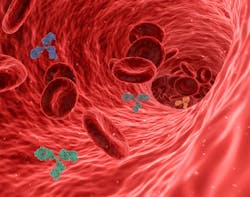Using high-throughput screening method to phenotypically identify specific B cell subsets
B cells — immune cells known for producing antibodies — participate in both protective and autoimmune responses. Understanding how antigen-specific B cells (ASBCs) contribute to autoimmune disease requires identification and study of these cells, which are as rare as 1 in 20 million blood cells.
Rachel Bonami, PhD, and colleagues have developed a high-throughput screening method to phenotypically identify specific B cell subsets, expand them in vitro, and drive them to secrete antibodies.
The investigators validated their approach using peripheral blood mononuclear cells from patients with several autoimmune diseases and from donors at risk for type 1 diabetes based on family history and presence of islet autoantibodies.
The studies, reported in Frontiers in Immunology, will enhance efforts to study ASBCs and potentially harness them as biomarkers for tracking autoimmune disease severity and response to therapy. ASBCs may also be valuable targets for developing treatments that avoid the broad immune suppression associated with current therapies for autoimmune diseases.

